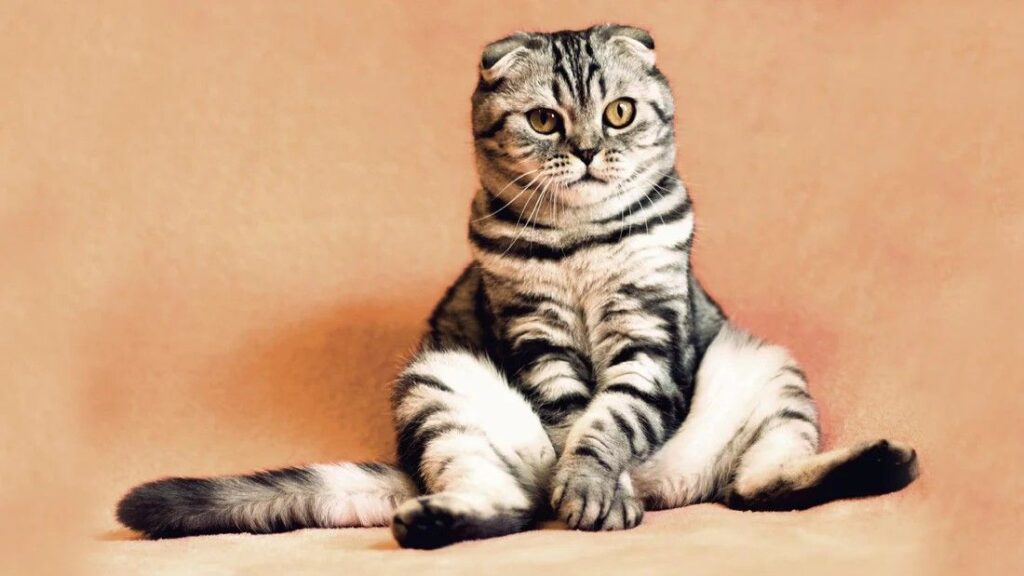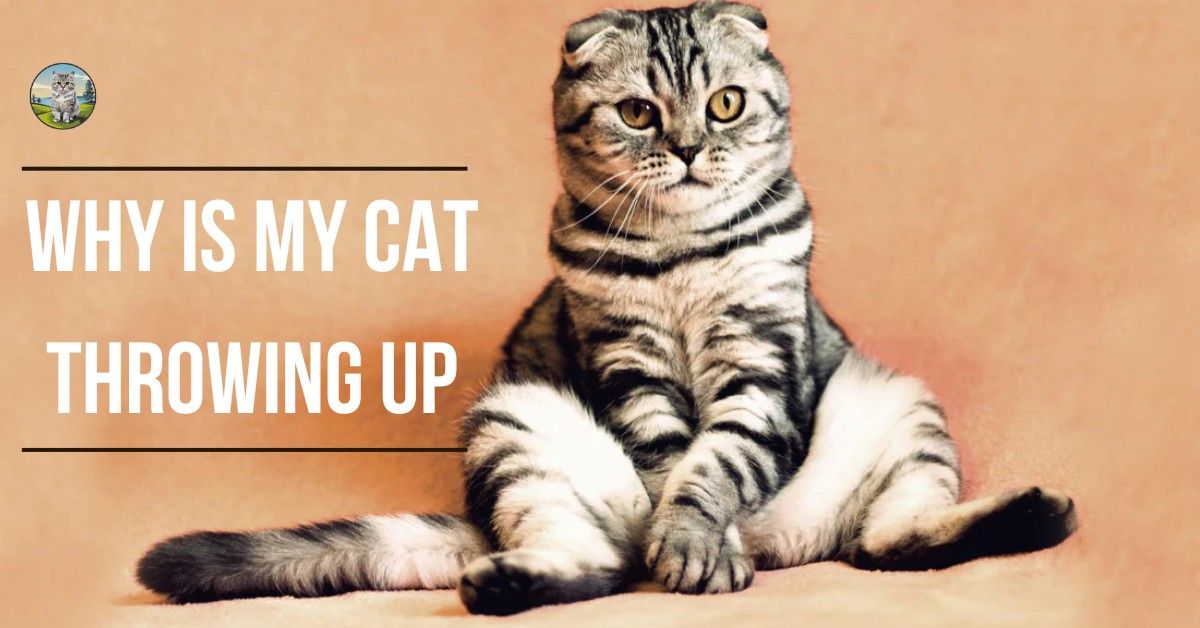Cats are known for their independent and often mysterious nature, but when it comes to their health, vomiting can be a concern for any pet parent. In case you’ve been wondering, “Why is my cat throwing up?” you’re not alone. Cat vomiting can stem from various causes, ranging from benign to serious. In this article, we’ll explore the common reasons your cat might be vomiting and help you understand when to worry and what actions you can take.

Typical Causes of Your Cat’s Vomiting
1. Hairballs
Cats groom themselves frequently, and in the process, they ingest a lot of fur. This fur can form hairballs in their digestive system, which they often vomit up. Occasional hairball vomiting is normal, but if it’s happening frequently, it could be a sign of an underlying issue.
Why would my cat be throwing up? It might simply be due to hairballs.
2. Eating Too Quickly
Many cats, especially those in multi-cat households, tend to eat their food too quickly. This fast eating can lead to regurgitation shortly after meals. If your cat is throwing up undigested food, try slowing their eating pace by using a slow feeder or breaking up their meals into smaller portions.
Why does my cat keep throwing up? Rapid eating could be the culprit.
Dietary Indiscretion
Cats can be curious eaters, and they sometimes ingest things they shouldn’t, like plants, small objects, or spoiled food. This can lead to gastrointestinal distress and vomiting. Switching foods too quickly can also upset their stomach.
Why is my cat throwing up so much? Dietary changes or non-food ingestion may be the cause.
Serious Health Issues Leading to Vomiting
While some causes of vomiting are relatively benign, others can signal more serious health concerns. Let’s explore those.
Food Allergies or Intolerances
If your cat is consistently vomiting after meals, it could indicate a food allergy or intolerance. Common allergens include fish, dairy, and grains. An elimination diet, where you gradually introduce new foods, can help identify the allergen.
Gastrointestinal Issues
Cats can suffer from gastrointestinal diseases like inflammatory bowel disease (IBD) or gastroenteritis, both of which can cause frequent vomiting. If your cat is throwing up multiple times a week, it’s important to consult a veterinarian to explore these conditions.
Why does my cat keep throwing up? Persistent vomiting could point to a GI issue.
Ingesting Toxins
Cats are sensitive to toxins, which can be found in certain plants, household chemicals, or even human foods like chocolate or onions. If your cat ingests a toxic substance, they may vomit as the body attempts to expel the poison.
Why is my kitten throwing up? Kittens are more prone to exploring and might ingest harmful substances.
Liver or Kidney Disease
As cats age, they may develop liver or kidney disease, which can result in frequent vomiting. These conditions interfere with the body’s ability to process toxins, leading to nausea and vomiting.
Why is my cat always throwing up? Chronic diseases like liver or kidney disease could be a contributing factor.
Pancreatitis
Pancreatitis is an inflammation of the pancreas and can cause severe vomiting in cats. Cats with pancreatitis often show other signs of illness, such as lethargy, loss of appetite, or abdominal pain.
Why is my cat throwing up bile? Bile vomiting could indicate pancreatitis or another serious gastrointestinal issue.
Parasites
Internal parasites, such as worms, are a common cause of vomiting in kittens and outdoor cats. Roundworms, in particular, can lead to stomach irritation and frequent vomiting. Frequent deworming procedures can assist in averting this.
Why does my kitten keep throwing up? Parasites may be the problem if your kitten vomits often.
Foreign Body Obstruction
Cats, especially young ones, might swallow foreign objects like toys, strings, or hair ties, which can obstruct the intestines. This can lead to life-threatening blockages, often accompanied by vomiting. If you suspect your cat has ingested something they shouldn’t take them to the vet immediately.
Why is my cat throwing up water? When your cat is vomiting water or clear liquid, it may be a sign of a blockage or another serious condition.
Red Flags: When to Call the Vet
While occasional vomiting may not be a cause for concern, there are certain red flags to watch for that may indicate your cat needs medical attention:
Frequent vomiting: If your cat vomits multiple times a day or over consecutive days, it’s time to see a vet.
Vomiting blood: Why is my cat throwing up blood? Blood in your cat’s vomit could signal a serious issue, such as an ulcer or internal injury, and should never be ignored.
Weight loss or lethargy: If your cat is losing weight or acting unusually lethargic, this could indicate a more severe underlying condition.
Diarrhea and dehydration: These symptoms paired with vomiting can lead to dangerous dehydration, especially in kittens.
Treatment and Prevention of Cat Vomiting
1. Slow Down Mealtime
For cats that eat too quickly, try using a slow feeder or puzzle feeder to slow them down and prevent regurgitation.
2. Hairball Remedies
Regular grooming can reduce hairball frequency, especially for long-haired cats. You can also provide hairball control foods or supplements.
3. Keep Toxic Substances Out of Reach
Ensure that harmful plants, household chemicals, and foods are stored out of your cat’s reach. Consider using pet-safe cleaning products.
4. Maintain a Stable Diet
Avoid sudden changes in your cat’s diet. Gradually introduce new foods for 7-10 days to allow their digestive system to adjust.
5. Regular Vet Visits
Routine veterinary care, including vaccinations, parasite control, and regular check-ups, is essential to keep your cat healthy and reduce the risk of vomiting.
Conclusion
As you have asked, “Why is my cat throwing up?” the answer can vary from simple causes like hairballs and fast eating to more serious issues like gastrointestinal diseases, toxins, or blockages. While occasional vomiting may not be an immediate cause for concern, it’s important to monitor your cat’s behavior and seek veterinary care when necessary. Keeping your cat on a stable diet, providing regular grooming, and ensuring they avoid harmful substances can help minimize vomiting episodes.
Frequently Asked Questions (FAQs)
1. Is my cat vomiting food that hasn’t been fully digested?
Cats often vomit undigested food when they eat too quickly. This can cause regurgitation soon after meals. Slowing down their eating pace or offering smaller, more frequent meals can help.
2. Why is my cat throwing up yellow bile?
Vomiting yellow bile usually occurs when a cat’s stomach is empty, leading to the expulsion of stomach acid. This could indicate digestive issues, such as gastritis or pancreatitis. If it happens frequently, consult your vet.
3. Why is my cat throwing up white foam?
White foam vomiting may happen when a cat’s stomach is empty and only produces gastric juices. It can be linked to conditions like acid reflux or hairballs. If it persists, a vet check-up is advised.
4. When should I be worried about my cat vomiting?
If your cat vomits frequently, shows signs of lethargy, loses weight, vomits blood, or experiences diarrhea, it’s time to consult a veterinarian. These can point to a more serious health issue. To prevent vomiting, feed your cat a consistent diet, offer slow feeders if it eats too quickly, groom it regularly to reduce hairballs, and keep harmful substances and toxic plants out of reach.


